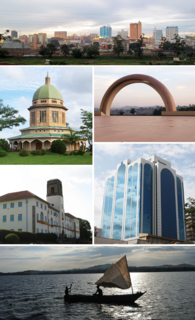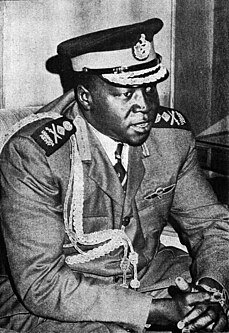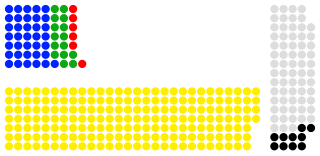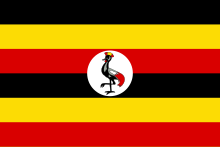
Kampala is the capital and largest city of Uganda. The city is divided into five boroughs that oversee local planning: Kampala Central Division, Kawempe Division, Makindye Division, Nakawa Division, and Rubaga Division. Surrounding Kampala is the rapidly growing Wakiso District, whose population more than doubled between 2002 and 2014 and as of 2014 Wakiso was reported to stand at over 2 million.

Uganda is a presidential republic, in which the President of Uganda is both head of state and head of government. There is a multi-party system. Executive power is exercised by the government.
The history of Uganda comprises the history of the territorial lands of present-day Uganda in East Africa and the peoples inhabiting therein.

Endowed with significant natural resources, including ample fertile land, regular rainfall, and mineral deposits, it is thought that Uganda could feed all of Africa if it were commercially farmed. The economy of Uganda has great potential, and it appeared poised for rapid economic growth and development.

The Uganda Peoples' Defence Force (UPDF), previously known as the National Resistance Army, is the armed forces of Uganda. From 2007 to 2011, the International Institute for Strategic Studies estimated the UPDF had a total strength of 40,000–45,000 and consisted of land forces and an air wing.

Idi Amin Dada Oumee was a Ugandan politician and military officer. He served as the President of Uganda from 1971 to 1979.

Apollo Milton Obote was a Ugandan political leader who led Uganda to independence in 1962 from British colonial administration. Following the nation's independence, he served as Prime Minister of Uganda from 1962 to 1966 and President of Uganda from 1966 to 1971, then again from 1980 to 1985. He was overthrown by Idi Amin in 1971, but regained power after Amin's 1979 overthrow. His second period of rule was marred by repression and the deaths of many civilians as a result of a civil war known as the Ugandan Bush War.

Yoweri Kaguta Museveni is a Ugandan politician who has been President of Uganda since 1986. Museveni was involved in rebellions that toppled notorious Ugandan leaders Idi Amin (1971–79) and Milton Obote (1980–85) before capturing power in the 80s. In the mid to late 1990s, Museveni was celebrated by the West as part of a new generation of African leaders. During Museveni's presidency, Uganda has experienced relative peace and significant success in battling HIV/AIDS. At the same time, Uganda remains a country suffering from high levels of corruption, unemployment and poverty. Museveni's presidency has been marred by involvement in the civil war in the Democratic Republic of the Congo and other Great Lakes region conflicts; the rebellion in Northern Uganda by the Lord's Resistance Army which caused a drastic humanitarian emergency; and the suppression of political opposition and constitutional amendments scrapping presidential term limits (2005) and the presidential age limit (2017), thus enabling the extension of his rule. These have been a concern to domestic and foreign commentators.

Joseph Rao Kony is the leader of the Lord's Resistance Army (LRA), a guerrilla group that formerly operated in Uganda.

The President of the Republic of Uganda is the head of state and head of government of Uganda. The president leads the executive branch of the Government of Uganda and is the commander-in-chief of the Uganda People's Defence Force.

Uganda is divided into 127 districts and the capital city of Kampala, which are grouped into four administrative regions.

The Uganda national football team, nicknamed The Cranes, is the national team of Uganda and is controlled by the Federation of Uganda Football Associations. Their best finish in the Africa Cup of Nations was second in 1978.
The New Vision is an English-language newspaper published daily in print form and online.

Makerere University, Kampala is Uganda's largest and third-oldest institution of higher learning, first established as a technical school in 1922. In 1963, it became the University of East Africa, offering courses leading to general degrees from the University of London. It became an independent national university in 1970 when the University of East Africa was split into three independent universities: University of Nairobi (Kenya), University of Dar es Salaam (Tanzania), and Makerere University. Today, Makerere University is composed of nine colleges and one school offering programmes for about 36,000 undergraduates and 4,000 postgraduates.

The unicameral Parliament of Uganda is the country's legislative body.

The Uganda–Tanzania War, known in Tanzania as the Kagera War and in Uganda as the 1979 Liberation War, was fought between Uganda and Tanzania from October 1978 until June 1979, and led to the overthrow of Idi Amin's regime. Idi Amin's forces included thousands of troops sent by Libya.

The Ugandan Bush War, also known as the Luwero War, the Ugandan civil war or the Resistance War, was a civil war fought in Uganda between the Uganda National Liberation Army (UNLA) and a number of rebel groups, most importantly the National Resistance Army (NRA), from 1980 to 1986.

The Lord's Resistance Army (LRA), also known as the Lord's Resistance Movement, is a rebel group and heterodox Christian group which operates in northern Uganda, South Sudan, the Central African Republic, and the Democratic Republic of the Congo. Originally known as the United Holy Salvation Army and Uganda Christian Army/Movement, its stated goals include establishment of multi-party democracy, ruling Uganda according to the Ten Commandments, and Acholi nationalism, though in practice "the LRA is not motivated by any identifiable political agenda, and its military strategy and tactics reflect this". It appears to largely function as a personality cult of its leader Joseph Kony, a self-declared prophet whose leadership has earned him the nickname "Africa's David Koresh".
PostBank Uganda is a non-bank credit institution in Uganda. Its activities are supervised by the Bank of Uganda, the country's central bank and national banking regulator.


















